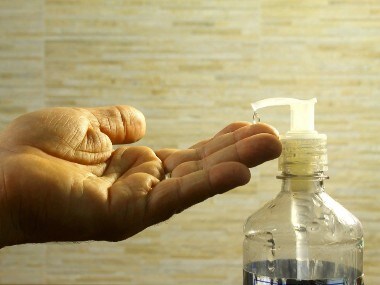An increasing number of public places now have hand sanitizer dispensers just as you enter, next to the washrooms and even at each table in restaurants. This can be attributed to increased public awareness or a higher number of lawsuits against restaurants where customers fall sick. The World Health Organisation (WHO) has suggested that regular hand washing is crucial to prevent infections as germs can easily transfer from your hand to mouth. Recent news dispatches from the US have reported that local pharmacies and general stores are running out of hand sanitizers in the wake of coronavirus. [caption id=“attachment_8112781” align=“alignleft” width=“380”]  Representational image. Image by Adriano Gadini from Pixabay[/caption] Given that we don’t always have access to soap and a washbasin, can hand sanitizers be used to kill disease-causing germs? There have been concerns about hand sanitizers contributing to an increase in antimicrobial resistance - do these claims hold water? Here is an overview of the mechanism, application and effectiveness of hand sanitizers.
How does hand sanitizer work?
Most hand sanitizers are alcohol-based. They are made of ethanol, isopropanol, water and glycerol. The alcohol dissolves the outer wall of bacteria and viruses; the hydroxyl groups break up the peptide bonds present in the inner membrane. This makes them ineffective in spreading infection. So why don’t we just rub our hands with alcohol? For starters, most hand sanitizers have higher alcohol content than the strongest liquor. In fact, you should pick sanitizers that have at least 60% alcohol or more. Further, the glycerol in the solution is what makes sanitizer gel-like and less fluid than regular alcohol. This is great in terms of portability and makes the solution emollient; just using alcohol will make your hands scaly and dry, whereas glycerol leaves the hands feeling soft.
Are hand sanitizers effective against coronavirus?
Coronavirus is an envelope virus - meaning it has an outer coat on which alcohol can act. So yes, hand sanitizers are effective against coronavirus, but they don’t offer complete protection. Coronavirus can spread through aerosols as well, so maintain distance from someone who is coughing or sneezing. Experts agree that handwashing remains the gold standard when performed correctly, however. Make sure to thoroughly wash the palms, fingers, area under the nails, back of the hands and rinse under running water for 20 seconds. Drying your hands is also crucial - use a disposable towel to ensure they are fully dry. Studies have shown that disease transmission is more efficient via wet hands. You can use hand sanitizer when you don’t have access to a sink or are on the move - the protection it provides can be critical and is definitely better than nothing. Make sure to use enough to adequately cover your hands. The study ‘Comparative assessment of antimicrobial efficacy of different hand sanitizers’ published in 2016 compared four hand sanitizers and concluded that Sterillium was the most effective in maintaining hand hygiene. The researchers also declared no conflict of interest.
When should you not use hand sanitizer?
This part is important - if your hands are oily and visibly dirty, hand sanitizer won’t be as useful. The alcohol cannot penetrate the dirt and oils so it won’t effectively reach the germs you are trying to kill. Wash your hands with soap and get rid of the dirt and grime to prevent getting sick. Studies have also shown that hand sanitizers may not be as effective against heavy metals and pesticides. If you have been digging around in a garden or are a factory worker, rely more on traditional handwashing.
What about antimicrobial resistance?
The theory is that using hand sanitizers too often could lead to antibacterial (or antibiotic) resistance, which means the bacteria will adapt and not be affected (or killed) by the sanitizer anymore. Alcohol-based hand sanitizers are regularly used in hospitals and there is no research to support that they could lead to antimicrobial resistance. But, it may be a possibility if you’re using alcohol-free or antibacterial hand sanitizers - so, avoid using those. Basically, if you make sure to use a hand sanitizer that contains over 60% of alcohol, you should be fine.
What is better: handwashing with soap or hand sanitizer?
There is nothing wrong with using alcohol-based hand sanitizer, but hand washing remains the better option. While hand sanitizers kill a whole bunch of germs, often our hands are oily and dirty, which reduces their effectiveness. Handwashing is more thorough and does a better overall job of protecting you against infectious diseases. Some viruses, such as norovirus and rhinovirus (one of the viruses that cause the common cold), are unaffected by hand sanitizer since they don’t have an outer wall. Having said that, hand sanitizers are fine as a stopgap measure - when you are travelling or don’t have access to a sink, use them liberally before you eat or after touching various surfaces. For more information, read our article on Infections: Symptoms, Causes and Treatment_._ Health articles in Firstpost are written by myUpchar.com, India’s first and biggest resource for verified medical information. At myUpchar, researchers and journalists work with doctors to bring you information on all things health.


)

)
)
)
)
)
)
)
)



